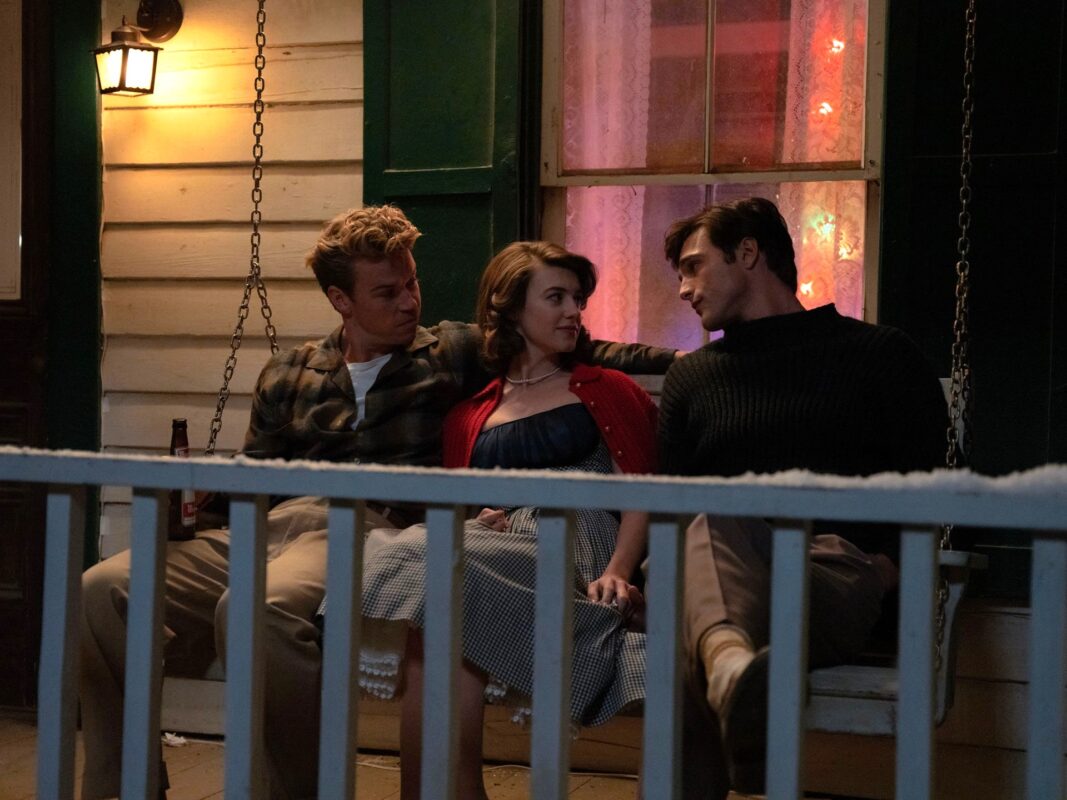
When Jacob Elordi hosted SNL, virtually every skit was about how beautiful he is. It was as though, confronted with this 6’5” Adonis, the writers’ brains turned to mush and all they could think was, “He’s sooooo pretty I could die.” The lean, square-chinned, bedroom-eyed Elordi seems to have this effect on directors as well. Emerald Fennell’s Saltburn was, in some ways, a two-hour homage to Elordi’s beauty—and she was so enamored with him, she went ahead and cast him as Heathcliff in an upcoming adaptation of Wuthering Heights (a misbegotten project by any measure, but apparently Fennell can’t help herself).
And now we have Daniel Minahan’s On Swift Horses, which might be the guiltiest of all when it comes to sexualizing and aestheticizing Elordi. When we first meet Elordi’s Julius, he’s ambling down the road, shuffling a deck of cards, which I immediately took as a bad sign. Is he a character or some mythologized symbol of an outlaw American gambler? (A bit of both, it turns out, but mostly the latter.)
Julius is heading to the Kansas home where his brother, Lee (Will Poulter), and soon-to-be sister-in-law, Muriel (Daisy Edgar-Jones), live. She looks out the window, languorously (almost everyone does everything languorously in this film) and sees Julius stretched out on a car hood, shirtless, having a smoke. Why is he shirtless and having a smoke? (It’s snowing by the way.) Because it looks incredibly hot, I suppose.
I turned against On Swift Horses in that moment but it ended up at least somewhat ingratiating itself to me. Minahan, it turns out, is a sensualist, who fetishizes not just Elordi but all beauty—people, hotel interiors, horses, the Vegas strip (but especially Elordi). The film, set in the 1950s, is gorgeous to look at—with its carefully composed images, it’s a mid-century coffee table book come to life. But because of that, despite its melodramatic premise, it somehow manages to be both overheated and dramatically inert.
From that first moment she lays eyes on him, Muriel is completely besotted with Julius. It’s not just that she wants to bed him, it’s that he represents something alluring to her—sex, danger, adventure. Poor Lee is a solid and somewhat dull sweetheart. He wants nothing more than a regular life, something he and Julius were deprived of as boys.
To that end, Lee has finally convinced Muriel to marry him (he proposes in front of Julius, a rare bit of possessive posturing on his part, and Muriel gives Julius a panicky look before agreeing). The couple move to San Diego, where Julius is supposed to join them, but doesn’t. Instead, he heads to Vegas.
Julius isn’t the sole reason Muriel is restless in San Diego, but he has triggered something in her. She wants him to return, desperately, but finds other ways to stimulate herself. First, she starts going to the race track and betting on horses and actually makes a lot of money. (She works at a diner frequented by jockeys and horse owners; she secretly eavesdrops to get tips.) Tellingly, she doesn’t share her winnings with Lee. Instead, she gives him a small amount, lying and saying that she sold her childhood home in Kansas. Later, she meets a tomboyish woman she finds alluring. Is Muriel a lesbian or is she just searching for something—anything—to break her from the trappings of the middle class?
For his part, Julius is not completely immune to Muriel’s charms, but he definitely prefers men. In Vegas, he does some low-stakes gambling and works as a hustler, bedding both men and women, until he finds a job at a casino. His job is to spy on the gamblers from behind a two-way mirror on the ceiling and let the bouncers know if there’s any funny business. In a charming scene, he recoils when a woman looks up at the casino ceiling, then smiles with boyish awe when he realizes she can’t see him.
Also working the overhead shift, as it were, is Henry (Diego Calva), a Mexican immigrant, who immediately falls for Julius. He seduces him, although it doesn’t take much work, and they commence a secret love affair. The film doesn’t shy away from sex scenes between the men and there is one glorious shot where they are having sex in front of a mirror, making it look as though they are having a foursome. And rest assured there are plenty—plenty!—of scenes of a post-coital Julius draped in a chair, wearing a tight tank top, taking slow draws of his cigarette. Not since Richard Gere in American Gigolo has a man been shot with such seductive intensity.
Julius is uncharacteristically happy with his life in Vegas, but Henry wants more. He proposes that they steal from the casino. Julius isn’t so sure. The tiny gold pistol that Henry wears around his neck is an indication that something ominous might be in the offing.
Julius eventually does get to San Diego, a horse in tow. “I thought you had a ranch!” he tells his brother. “It’s a goddamn ranch house,” Lee replies—the film’s best (only?) joke.
I laughed at the over-the-top sensuality of On Swift Horses more than once—at one point, Muriel meets an attractive woman at the track who complains about the heat and proceeds to slowly massage her wrist with an ice cube—but I can’t say I wasn’t at least slightly seduced by it. The film is too obsessed with surfaces to be particularly deep, but Daisy Edgar-Jones is especially good as a woman longing for something just out of her grasp and Will Poulter is a heartbreaking everyman. As for Elordi, he eats up the screen like the movie star he is. His Julius doesn’t have much interiority—everyone reacts to him. But his job is to be the object of desire and he is more than up to the challenge.
